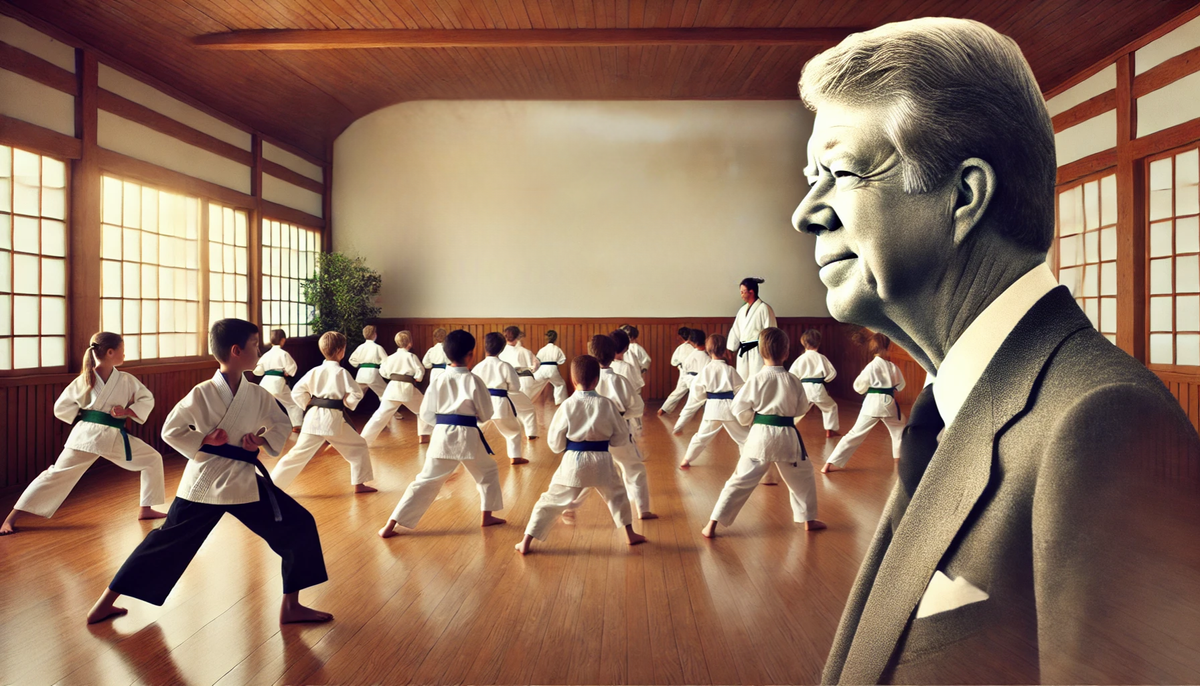Resilience and Integrity: Reflections on Leadership

Today, I returned to the dojo after a 15-day holiday break. The energy in the room was palpable, but something was off. Forms were loose, stances needed correction, and reminders of focus and discipline were in order. As I coached the kids, it struck me: this wasn’t just about martial arts. It was a powerful metaphor for leadership.
Later, I listened to eulogies and interviews about Former President Jimmy Carter. I already admired his legacy, but I didn’t realize that before taking office, Carter had placed his family’s peanut business into a blind trust to avoid potential conflicts of interest. After leaving the presidency, he learned the business was over $1 million in debt. Rather than letting this financial strain define him, Carter trusted the process, focused on the bigger picture, and ultimately sold the business. He pursued new income sources, like writing books, to recover financially and establish a new chapter in his life.
The parallels between Carter’s story and the dojo’s lessons became clear: leadership is about showing up, correcting course, and persevering with values intact.
Discipline and Course Correction
In martial arts, discipline isn’t a one-time achievement—it’s a practice. After two weeks away, the kids’ forms were loose, and their focus needed redirection. But that’s the beauty of discipline: it’s about returning to the basics, refining fundamentals, and staying committed to improvement.
Leadership operates the same way. Teams lose momentum. Strategies drift. Progress stalls. Great leaders don’t dwell on the missteps—they realign, correct course, and guide their teams back to the core mission. Just like in the dojo, leadership requires patience, consistency, and an eye for detail.
Takeaway for Leaders: When your team falters, start by revisiting the basics. Ask: What are we trying to achieve? Where have we strayed? What’s one step we can take to realign today?
Resilience in the Face of Challenges
Before taking office, Carter placed his peanut business into a blind trust, relinquishing control to avoid conflicts of interest. Years later, he discovered that the business was deeply in debt. Instead of letting this setback overshadow him, Carter relied on resilience. He adjusted his focus, sold the business, and explored new opportunities—including writing books—to recover financially and move forward.
Leaders face adversity daily. Market downturns, resource constraints, and unexpected hurdles can feel overwhelming. Resilience isn’t just about weathering the storm—it’s about using challenges as a catalyst for growth. It’s about finding a way forward, even when the path seems uncertain.
Takeaway for Leaders: Treat challenges as opportunities for transformation. The next time you encounter a setback, ask: What can I learn from this? How can I turn this into a stepping stone for future success?
Ethical Leadership and Legacy
At the dojo, integrity is as essential as mastering forms. We teach respect, courage, and the importance of doing what’s right—even when it’s difficult. Carter’s decision to put his business into a blind trust exemplifies this principle. At the time, it meant relinquishing control over his family’s livelihood—a significant personal sacrifice—to prioritize ethical leadership.
In leadership, integrity isn’t optional. It’s the foundation of trust, credibility, and lasting impact. Leaders who prioritize values over shortcuts build legacies that endure. When faced with tough decisions, the question isn’t What’s easiest? but What’s right?
Takeaway for Leaders: Ethical decisions often come with short-term challenges but lead to long-term gains. Ask yourself: What choice aligns with the legacy I want to leave?
Practical Takeaways
Here’s how to bring these reflections into your leadership practice:
- Return to the Basics: When your team loses focus or momentum, revisit foundational principles. Like correcting stances in the dojo, realign efforts with your core mission and values.
- Embrace Resilience: Treat challenges as opportunities to demonstrate strength and creativity. Identify one current setback and ask: How can this drive growth?
- Lead with Integrity: In tough moments, prioritize ethics over expedience. Reflect on the legacy you want to leave and let that guide your decisions.
Closing Reflection
Leadership, like martial arts, is a practice. It demands discipline to correct course, resilience to face challenges, and integrity to make the right choices. Jimmy Carter quoted his high school teacher, “We must adjust to changing times and still hold to unchanging principles.” That’s the essence of great leadership: staying true to your values while navigating an ever-changing world.
Today, whether in the dojo or on the global stage, the lessons are the same. Show up. Stay focused. Lead with purpose. And when things feel off-course, remember: it’s never too late to realign and move forward with integrity.
